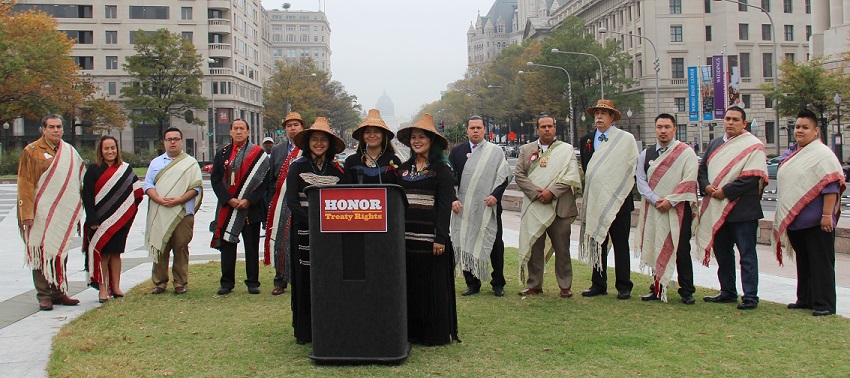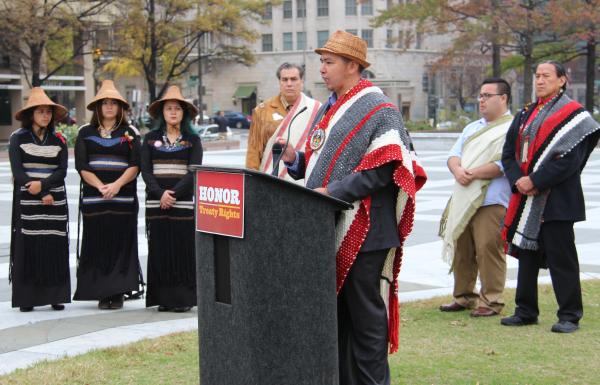In addition to the Lummi Nation, tribal members and leaders from the Tulalip, Swinomish, Quinault, Lower Elwha Klallam, Yakama, Hoopa Valley, Nooksack and Spokane nations were in attendance.
Chairman of the Lummi Nation Tim Ballew II came to the podium and told attendees and news crews that the 1855 U.S. treaty with Pacific Northwest Native American tribes, and associated rights for the fishing, hunting and sacred grounds was in jeopardy.
“We’re taking a united stand against corporate interests that interfere with our treaty-protected rights,” said Tim Ballew II, chairman of the Lummi Indian Business Council. “Tribes across the nation and world are facing challenges from corporations that are set on development at any cost to our communities.”
According to a release, for three years, Northwest treaty tribes, including Lummi Nation, Swinomish Indian Tribal Community, Tulalip Tribes, and Yakama Nation, and the Columbia River Intertribal Fisheries Commission have provided government agencies and elected officials detailed letters identifying the impacts the terminal would have on treaty fishing rights, the environment, natural resources and the health of Washington.

Lummi tribal members and sisters Billy Kennedy Jefferson, 18, Danielle Kennedy Jefferson, 16, and Kathrine Jefferson, 15, all from the Lummi Nation in western Washington state Photo: Vincent Schilling
The proposed Gateway Pacific Terminal (a subsidy of SSA Marine) would serve as a gateway to markets in domestics companies and Asia. The terminal would handle 60 million tons of commodities, mostly coal – but the project’s location includes Lummi ancestral burial sites and ancestral fishing grounds.
“The location of the pier will take away fishing grounds and the increase in vessel traffic would impede access of our fishermen to fishing grounds throughout our usual and accustomed areas.”
“We soundly reject developments that desecrate our sacred places and call on Congress to uphold our treaty-protected rights,” said Ballew.
“I credit the current administration for every year building on our efforts to help us rebuild our nations and I encourage them to continue that,” Ballew said. “We really want them to give this issue its due respect. It’s a human rights issue, it’s a treaty rights issue, and we need our sacred sites protected.”
“For thousands of years, Washington tribes have fought to protect all that is important for those who call this great state home. We live in a pollution-based economy and we can no longer allow industry and business to destroy our resources, water and land. No mitigation can pay for the magnitude of destruction to treaty resources for today and generations from now. As leaders, we need to protect our treaty resources, our economies, and the health of our citizens and neighbors.” said Brian Cladoosby, Chair, Swinomish Indian Tribal Community and president of the National Congress on American Indians in DC.
“The ancestors of all, Native and non-Native, witness those who have lost their integrity; the people of the present acknowledge as much; and the future generations will ask ‘Why did those ones who did not honor their own words allow it to happen?’ The past is the present and the future is now. The treaty is their word, our people trusted that word. Now, it seems to be just words. Do they lack the honor and integrity of their ancestors?” said Dave Brown Eagle, Vice-Chair, Spokane Tribal Business Council.

Dave Brown Eagle, Vice-Chair, Spokane Tribal Business Council at the White House Tribal Nations Council last week. Photo: Vincent Schilling
“This issue affects all of us, we’re connected in ways that the U.S cannot even imagine,” said Tyson Johnston, Vice-President of the Quinault Indian Nation.
The project is currently under review by the Seattle district U.S. Army Corps of Engineers. The State of Washington Department of Ecology has an environmental review listed here.


